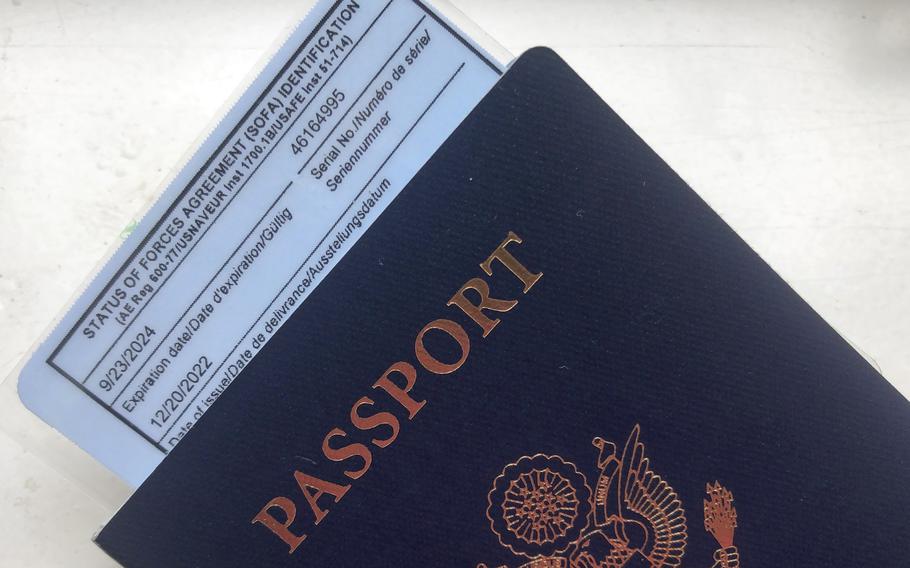
(Illustration by Sean Moores/Stars and Stripes)
NAPLES, Italy — For thousands of U.S. military families, an overseas assignment means living on the edge of poverty.
In Europe, nearly 7,000 U.S. service members or their spouses or children were in danger in the past year of not having enough to eat, Defense Department data show.
Those military families qualified for a low-income program designed to ensure that pregnant women, babies and toddlers don’t go hungry.
The reason for that hardship after being sent to Europe is rooted in a loss of income resulting from U.S. and NATO country prohibitions that keep military spouses from working overseas, program administrators say.
But the harm to military families doesn’t end there. The rules have created a pipeline of highly skilled, cheap — and in many cases free — labor exploited by military hospitals and other base organizations, a yearlong Stars and Stripes investigation shows.
For example, military spouses who are nurses, physical therapists or other medical professionals told Stars and Stripes they were encouraged to give as much as 40 hours a week to the American Red Cross or other organizations in the hope that doing so could lead to an eventual paid position.
In Germany, those professionals saved the DOD’s largest hospital overseas more than $600,000 in unpaid labor, according to Red Cross figures.
Other military spouses who found jobs on base in retail, food service or other areas earned as little as $10 an hour without paid holidays or leave.
Sometimes those spouses worked alongside local nationals who were paid considerably more for a similar job under union contracts.
Meanwhile, many spouses who hold U.S. green cards are effectively shut out of overseas base employment because of rules that require U.S. citizenship for most jobs.
Even lower-paying jobs in fields with critical shortages, like child care positions at bases in Europe, are open only to citizens of NATO member countries, leaving spouses with U.S. green cards who hail from allies like Australia, Japan, South Korea and elsewhere ineligible.
Other military spouses seeking to continue their home-based businesses must contend with confusing and inconsistently applied regulations that, among other restrictions, bar them from competing with base services and businesses, like the Army and Air Force Exchange Service — which took in $8.5 billion in worldwide revenue last year.
As a result, most military families sent overseas are forced to live on a single income, cutting expenses, digging into savings and, for some, relying on low-income government assistance to get by.
“It's depleted our family’s savings account, forced us to lower our standard of living and affected my mental health in that I feel I'm no longer a useful contributor for my family's well-being,” said one respondent in an informal Stars and Stripes survey posted to private Facebook groups for military spouses in Italy.
Federal food aid necessary
Mallory Hardgrove, a teacher, couldn’t find a job that paid enough to cover day care expenses during an assignment to U.S. Army Garrison Italy in Vicenza.
Relying solely on her active-duty husband’s income saw the family of five struggle to pay bills and buy groceries, she said.
Hardgrove and her three daughters were among 1,176 people at five bases in Italy receiving benefits from the Women, Infants and Children program, according to data from U.S. European Command spanning from Jan. 1 to Oct. 26, 2022.
In all, 6,786 people at U.S. bases in Europe qualified for the supplemental food program managed by the Defense Health Agency. More than half were assigned to bases in Germany, data from the same period show.
The DHA did not respond to multiple requests by Stars and Stripes for updated and more complete data.
Worldwide, including at bases in Japan and South Korea, there were 7,825 people receiving WIC Overseas vouchers for milk, cheese, eggs, peanut butter, vegetables, formula and other nutritious foods as of Jan. 5, EUCOM said in a separate statement.
“It was a bitter pill to swallow,” Hardgrove said of the first time she used WIC vouchers at the commissary. Hardgrove, who never had previously received low-income assistance, recently returned to the U.S. with her family after three years in Italy.

A NATO Status of Forces Agreement identification card is effectively a residency visa for U.S. military personnel and their families living in Europe. But in many countries where U.S. forces are stationed, spouses either can't work or face daunting obstacles to employment. (Stars and Stripes)
Sunk in the SOFA
At issue in Europe is a pact signed in 1951, when fewer women worked outside the home and well before the existence of a digital workplace. There are similar agreements between the U.S. and other countries, such as Japan.
The NATO Status of Forces Agreement sets the rules, rights and responsibilities according to which U.S. troops may live and work in allied member countries.
However, the agreement doesn’t directly address dependents’ employment, making military spouses vulnerable to U.S. and host country interpretations that often limit their job opportunities.
For example, in Italy and Belgium, spouses must give up their SOFA status if they want to work anywhere other than on base, including remotely for an American employer.
But military spouses living in Germany can work for a German employer or telecommute to their American job without losing their SOFA status in most cases. Telework also is allowed in Japan, South Korea and Bahrain.
Various agreements also restrict on-base jobs available to military spouses, frequently limiting them to entry-level, low-paying positions regardless of their education, experience or skills.
Confusion about what is allowed is made worse by opaque diplomatic and military agreements as well as vague and misleading official interpretations of those pacts.
Many spouses don’t pursue telecommuting or other career options because they lack clear information or fear unintended consequences, advocates say.
For example, in summer 2021, military spouses attending an orientation briefing at Naval Support Activity Naples were given information implying that work anywhere but on base was illegal, according to a photograph of a presentation slide given to Stars and Stripes.
That information was false and amounted to fearmongering, said Beth Conlin, Military Spouse Chamber of Commerce board chair and Blue Star Families research and policy team adviser.
Conlin argues that clear explanations of all employment options overseas should be made available to military spouses.
After she pointed out the error, the base made modifications to explain that off-base employment is possible, Conlin said.
The briefing slide in question is no longer used, Morgan Gilliam, a U.S. Navy Europe Africa Central spokeswoman, said in a statement.
Gilliam went on to say that the Navy periodically updates the information it offers based on questions from its community.
But confusion about overseas spouse employment persists, and the quality and accuracy of information offered varies among bases, spouses say.
For years, U.S. military installations in Italy have warned spouses that giving up their SOFA rights would result in the loss of certain privileges, such as shopping on base, visiting the commissary or using the mail system, among others.
Those fears also are expressed by spouses living in Belgium and in non-NATO countries, such as Japan.
But spouses at NSA Naples and other naval bases in Italy learn different information.
“As long as dependents have a valid military ID, they have access to the commissary, (Navy Exchange, Morale, Welfare and Recreation) services, and emergency medical/dental services while in Italy,” Gilliam said in a separate response to Stars and Stripes questions.
That position is more in line with that of Conlin and others who say those privileges are tied to an active-duty service member’s orders, not SOFA status or an Italian residency permit.
However, NSA Naples does warn that spouses who get an Italian work permit could be taken off military orders and likely would lose some benefits, such as a NATO driver’s license, Gilliam said.

Members of Blue Star Families participate in a food drive benefiting military families in May 2021 at the Bronx Veterans Affairs Medical Center in New York. The organization provides food drives for military and veteran families in need. Similar needs exist in Europe, where military families receive federal vouchers to buy food. (Blue Star Families)
Heavy on unpaid labor
Kennedi Pettway, a registered nurse whose husband works at Supreme Headquarters Allied Powers Europe, has been unemployed since moving to Belgium about a year ago.
Pettway interviewed for a nursing job several months ago and recently learned that she had been selected.
But during her job search, Pettway had considered following advice to volunteer for the American Red Cross because it would get her foot in the door, she said.
“People would know my face, and it probably would be easier for me to get a job on base,” Pettway said she was told.
She ultimately didn’t volunteer for the organization.
Faced with letting their skills and knowledge atrophy or licenses lapse, military spouses work as much as 40 hours a week for on-base organizations that pay them nothing for valuable nursing, marketing, management or other abilities.
Using nurses in volunteer positions at bases is common, said Elayne Saejung, a military spouse who couldn’t get a job in her field of health care emergency management while she was in Okinawa during the COVID-19 pandemic.
“It’s good enough for volunteer service but they won’t pay them for it,” Saejung said.
At Landstuhl Regional Medical Center in Germany, about 275 Red Cross volunteers accounted for about 20,600 volunteer hours in the past year, a service worth about $655,000, based on a $31.80-per-hour federal estimate for volunteer work, according to the nonprofit agency.
Those volunteers performed such duties as clerical tasks, assisting patients or drawing blood for lab work. Spouses also have worked unpaid as obstetricians, dentists, nurses and physician assistants, among others.
“The employment opportunities just aren’t the same here, so (military spouses) are more likely to volunteer in that professional capacity,” to keep their skills or resume current, said Samantha Wudel, program director for the Kaiserslautern Military Community American Red Cross chapter. “At home, they could get a full-time job in that area.”
Red Cross and Pentagon policies prohibit volunteers from filling paid staff billets, Wudel noted.
Cindy Gourlie, an experienced restaurant manager and trained sommelier, wanted to continue her U.S.-based catering business when her active-duty husband was assigned to a post in Belgium.
But that wasn’t possible because of SOFA-related restrictions that limited her work-from-home options.
Gourlie did find a job helping to open a coffee shop at Chievres Air Base. She also created a menu for it and ultimately became the manager. But the job paid far less than a comparable position in the U.S. and offered no paid vacation or holiday leave, she said.
“You end up having no job or selling your soul for $10 an hour,” Gourlie said.
Even when spouses can put advanced skills to work through a home-based business, they face a daunting review process that can take months and significantly limit the products or services they offer.
Victoria Negrete Furnary wanted to offer physical therapy services in her home at Yokota Air Base near Tokyo. It took more than four months to get the necessary approval, which came just before Furnary’s active-duty husband received early orders for a new assignment.
“You can work in Japan but it’s very limiting,” Furnary said.
Onerous rules to ensure that hairstylists, bakers and other home-based workers don’t compete with or use products from base businesses, such as the commissary or exchange, further restrict spouse employment efforts, she said.

A mother helps her child sponge paint on heart-shaped paper at RAF Lakenheath, England in February 2018, at an event hosted by the Women, Infants and Children Overseas program. Because many military spouses cannot get a job overseas, thousands turn to the WIC Overseas program to buy groceries. (Shanice Williams-Jones/U.S. Air Force)
Remote obstacles
Hardgrove and other spouses in Italy and Belgium said they understand host country concerns about protecting jobs, but they argue that working for an American employer shouldn’t be a problem.
Lan Mai, a nurse who lives at NSA Naples, said being able to work remotely would allow her family to spend more money in Italy rather than stay on base for lack of funds to eat out or travel.
“If I’m doing remote nursing for Americans, I’m not taking away from the Italian economy because I’m not taking their jobs,” said Mai, whose husband is active-duty Navy. “Everybody wins if we have more jobs. We have more money to spend on our economy and this economy.”
U.S. officials say they understand the worries and frustrations of military families. They point to base programs that help spouses with job searches, resume writing and education or skills acquisition as part of an effort to address the problem.
Policies that give military spouses preference over other federal job applicants in some cases also help, they say.
And diplomatic efforts, such as ongoing conversations with Italy about loosening restrictions on employment and a recent agreement with Bahrain that allows military spouses there to work off base, are evidence of U.S. commitment to a resolution, they say.
For example, Deputy Secretary of State Wendy Sherman discussed U.S. military spouse employment with Italian officials in January, a State Department spokesman said in February.
“We hope to find a solution soon,” the spokesman said.
Back home to get work
More than lost income, though, many people married to a service member said moving overseas with their active-duty spouse has robbed them of the sense of identity, purpose and accomplishment that comes from working.
They also are plagued by low self-esteem and feelings of worthlessness and shame.
“It’s tough financially not having a second income but it’s also hard on the morale and mental state of spouses having to sacrifice their career to support their active-duty spouse,” one Stars and Stripes survey respondent said.
Those feelings and a desire to contribute financially leave some spouses considering returning to America without their husband or wife.
Aurora Venden, whose husband is active-duty Army, volunteered for a couple of service organizations at Vicenza since arriving in January 2020.
She was fortunate enough to get a job at one for a couple of years, but the position was eliminated. She was applying for stateside employment and had planned to go home early rather than remain unemployed.
But Venden recently was hired to do part-time work for a military contractor. Although she earns less than she used to, the job has eased her worries about student loan payments and allowed her to stay in Italy.
“I have no idea how we would have afforded the move (back to the U.S.), but it was like being backed into a corner,” Venden said. “There were just no other options.”
Claire Carter, whose family recently returned to the U.S. after six years in Belgium, doesn’t want to move overseas again unless she has more control over her job opportunities.
Carter resumed her career in human resources but is earning significantly less. That’s due to years of unemployment as part of living overseas, she said.
“If my husband goes, I would not follow this time,” Carter said, adding that she knows of other spouses who are making a similar decision. “I would stay in the States, and if a job came up, I would go and then be my own sponsor.”
Stars and Stripes reporter Jennifer H. Svan contributed to this report.